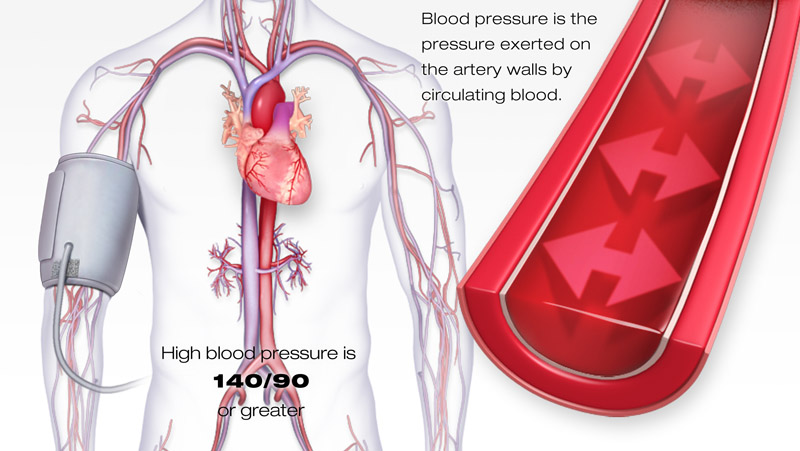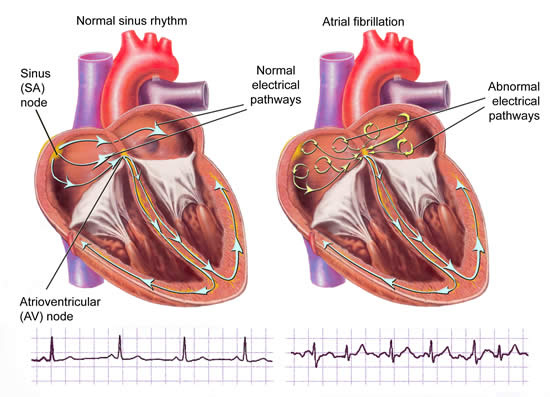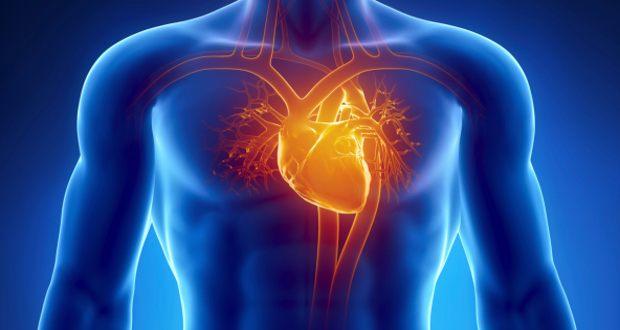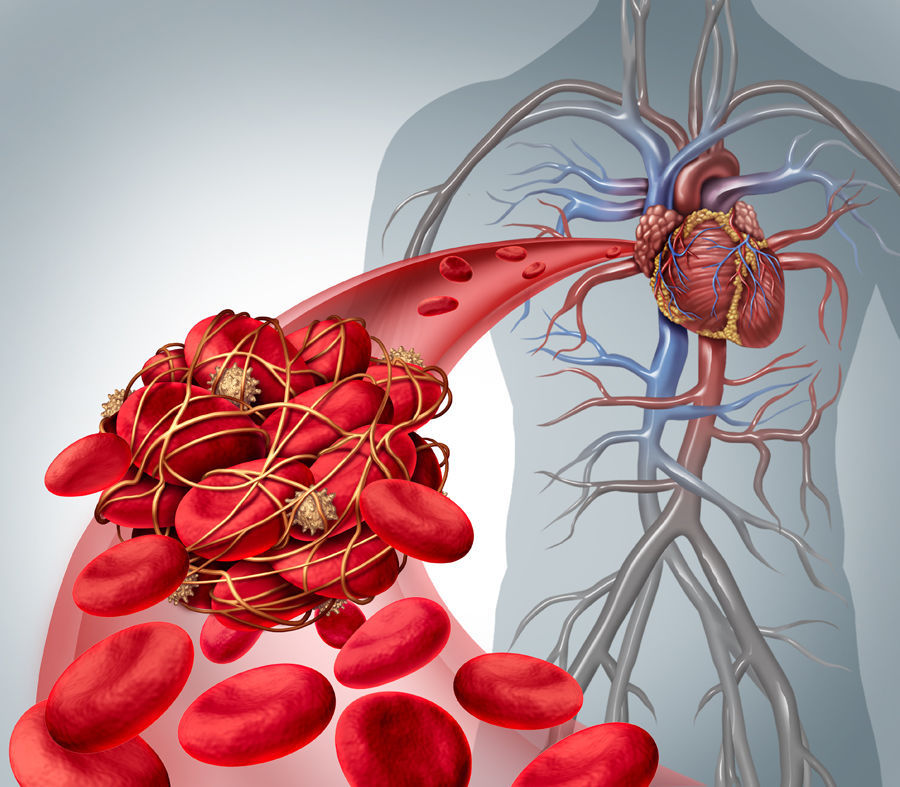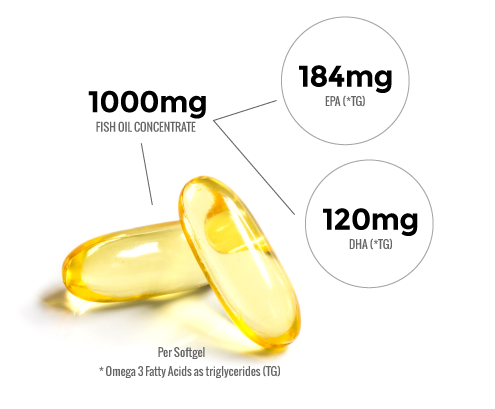Fish Oil for Cardiovascular Health, Some Remarkable Insights
The story of fish oil for cardiovascular health is at least some four decades old. With each passing decade the credibility of fish oil as a viable agent in the treatment and prevention of cardiovascular problems continues to be entrenched. In many ways, the world owes some thanks to a little known indigenous group in freezing Greenland. This group is the Inuit people which, prior to modernization, had a nomadic lifestyle.

The link between the Inuit and fish oil for cardiovascular health is remarkably similar to many beneficial medically related scientific discoveries that have occurred in history. Take for example the correlation between ticket conductors in London double-decker buses and cardiovascular exercise.
Researchers were drawn to the Inuit people in the 70s on account of an astonishing low incidence of ischemic heart disease first observed back in the 1940s. The population also had a zero prevalence of diabetes.
Looking closely into their diet, it was discovered that this indigenous group had whales, seals, sea birds, and fish firmly embedded in their daily dietary patterns. A further consideration of their fish diet revealed that fish gave the Inuit a daily dose rich in marine-derived omega-3 polyunsaturated fatty acids (PUFAs).
It turns out that the secret behind the scenes to the Inuit people's excellent cardiovascular health was fish oil. Today, a considerable amount of research has gone into exploring fish oil for cardiovascular health benefits. The results are extremely insightful.
But first...
Fish Oil for Cardiovascular Health, Must-Know about Fish Oil
Oily fishy has omega-3 polyunsaturated fatty acids (PUFAs). The oil found in fish is made up of two main components namely eicosapentaenoic acid (EPA) and docosahexaenoic acid (DHA). For simplicity, most people simply refer to these two omega-3 PUFAs as EPA and DHA.
Fish diet related cardiovascular benefits as enjoyed for so long by the Inuit people emanate from EPA and DHA which are the most important in fish oil.
The human body cannot create EPA and DHA, they are essential fatty acids. Fish oil is said to be rich in omega-3 fatty acids. When people talk about omega-3 fatty acids, they are referring back to the to the same omega-3 polyunsaturated fatty acids (PUFAs) in the form of EPA and DHA. These are the essential elements to know about fish oil.
It will soon be discovered that there is quite a great deal of interchangeability in the use of terms and names between fish oil and omega-3 fatty acids. On the whole, though, the aim is to say the same thing
Fish Oil for Cardiovascular Health, the Benefits
Fish oil related cardiovascular health benefits relate to the entire heart and blood system which in itself is the cardiovascular system. Lowering blood pressure, controlling hypertension and healing irregular heartbeat are some of the benefits of fish oil on the cardiovascular system.
Scientific studies carried out over the last four to five decades have contributed to the current insight into fish oil benefits on cardiovascular health. Below are some of the studies revealing remarkable insights into these benefits.
Study 1 - Shows a slow down or reversal of atherosclerotic heart disease, and a surprise
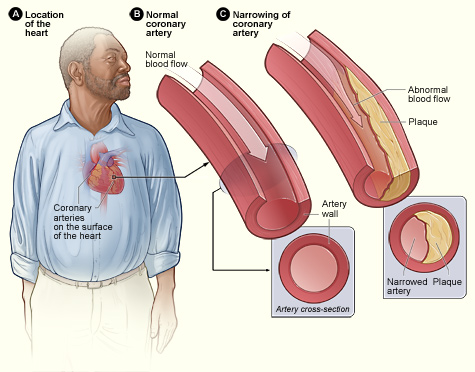
Image Credit: NHBLI
A 1999 study published in Annals of International Medicine (1999 Apr 6;130(7):554-62) concluded that omega-3 fatty acids in fish oil "modestly mitigates the course of coronary atherosclerosis in humans". Coronary atherosclerosis is the formation of plaque in the coronary arteries which results in the narrowing of the arteries. Coronary atherosclerosis is a major risk factor for hypertension, chest pains and heart attack, among other problems.
The 1999 study involved 223 patients with coronary heart disease who were assigned into groups with roughly half receiving dummy omega-3 fatty acids. From the group that received the real fish oil with 55% EPA and DHA, 14 showed mild regression of coronary atherosclerosis compared to 7 in the placebo group. These results came out after 2 years of treatment at a dosage of 6 grams per day for 3 months and then 3 grams per day for 21 months.
The surprise is that the study could not confirm that omega-3 fatty acids at least at the dosage used in the clinical study, lowered bad cholesterol as claimed by other studies. In fact, the researchers stated that "low-density lipoprotein cholesterol levels tended to be greater in the fish oil group".
In the final analysis, the study did confirm fish oil cardiovascular health benefits, atherosclerotic heart disease in particular, but had contradicting results on bad cholesterol which went up if compared to previous studies.

Study 2 - Confirms fish oil causes significant drops in blood pressure, maintains the surprise
Image Credit: American Heart Association
The use of fish oil for cardiovascular health benefits extends to include blood pressure. In 2015, the Journal of Research in Pharmacy Practice (2015 Jul-Sep; 4(3): 135–141) published a study adding to the long list of known omega-3 fatty acids cardiovascular health benefits.
The study involved 90 patients on home dialysis also known as continuous ambulatory peritoneal dialysis (CAPD). Over the following two weeks the patients were put in two groups one taking real omega-3 fatty acids and another taking a placebo. The fish oil group took 3 grams per day of omega-3 fatty acids
Both mean systolic blood pressure (top number) and diastolic blood pressure (bottom number) fell in the omega-3 group by 22.2 mm Hg and 11.95 mm Hg respectively, compared to the placebo group.
Another surprise that sprang up out of the study, contrary to the findings of a number of other studies done before, was that fish oil had no effect on the lipid profile of the CAPD patients. This is to say no meaningful changes were detected in serum triglyceride and total high-density lipoprotein and low-density lipoprotein cholesterol in the omega-3 group.
After all has been said and done, fish oil indeed reduced blood pressure although it had no impact on both good and bad cholesterol in the study group.
Study 3 - Fish Oil is Good for Irregular Heartbeat
Image Credit: Drholdright.co.uk
Cardiac arrhythmias is a common cardiovascular health problem whose prevention has been linked to fish oil. For clarity, cardiac arrhythmias is also known as irregular heartbeat or abnormal heartbeat. This condition is caused by misfiring electrical impulses in the heart resulting in the heart beating too fast or too slow.
The link between omega-3 fatty acids and cardiac arrhythmias has been confirmed in clinical studies. In 2013, the journal Current Opinion in Clinical Nutrition and Metabolic Care (2013 Mar;16(2):168-73) reported that fish oil is effective in preventing ventricular arrhythmias. This refers to confused electrical impulses emanating from the lower ventricles of the heart.
Furthermore, the report also shares that there is evidence suggesting that fish oil is effective in the prevention and treatment of atrial fibrillation. Atrial fibrillation is an irregular heartbeat that leads to potential complications such as blood clots, stroke and heart failure.
Study 4 - Fish Oil Reduces Risk of Sudden Cardiac Death in Men
Yet another fish oil benefit associated with cardiovascular health is reduced risk of sudden death caused by cardiac arrest. A study published in the journal JAMA (1998 Jan 7;279(1):23-8) concluded that "consumption of fish at least once per week may reduce the risk of sudden cardiac death in men."
The study conducted in the United States involved over 20500 American male physicians of ages 40 to 84. The study had a follow-up period of 11 years. In addition, this sample population was of men who had never suffered a heart attack, stroke or cancer. The study discovered a 48% risk of cardiac sudden death in men who ate dietary fish once a month compared to men who took dietary fish less than monthly.
Nevertheless, the study did not find any effect of fish oil in reducing the risk of heart attack and non-sudden cardiac death or total cardiovascular death.
Study 5 - Fish Oil Leads to Lower Atrial Fibrillation Incidence in Seniors
Image Credit: Betahealthexchange
One more fish oil benefit for cardiovascular health supported by studies shows a reduced incidence of atrial fibrillation (AF). Atrial fibrillation is a type of irregular heartbeat that leads to blood clots, heart failure and stroke. While it often has symptoms, sometimes it is asymptomatic.
A 2004 study appearing in the journal Circulation (2004 Jul 27;110(4):368-73) associated the consumption of fish prepared in a certain manner with a lower incidence of AF in seniors.
The study which involved over 4800 people of age 65 or higher showed that eating tuna, broiled or baked fish had an inverse relationship with the incidence of AF. Consumption of fish, one to four times per week reduced the risk by a further 28%. Fish had to be broiled or baked but not fried or served as a fish sandwich in order to produce these benefits.
What also came out of the study was that the consumption of fish did not show any association with reduced risk of heart attack or congestive heart failure suggesting that fish oil does not benefit these.
Summary of Fish Oil Cardiovascular Health Benefits
Below is a summary card of fish oil cardiovascular health benefits.
- Controlling hypertension
- Blood pressure lowering
- Hypertension prevention
- Clogged arteries
- Prevention of blood clots
- Treatment of chest pain
- Treatment of irregular heartbeat (cardiac arrhythmias)
- Treatment of kidney disease
- Reduced risk of all-cause death (all-cause mortality)
- Reduced risk of sudden cardiac death
- Reduced risk of coronary heart disease
- Reduced triglycerides levels
- Reduced risk of stroke
- Slow down or reversal of atherosclerotic heart disease
Fish Oil Dose for Cardiovascular Health - Is Fish Oil Safe?
Recommended fish oil dosage for the purposes of cardiovascular health is consistent with considerations around safety of omega-3 fatty acids. It is correct that fish oil is not harmless as it where. There have been noted side effects or undesirable health outcomes associated with the use of fish oil. The catch, however, is in the dose used.
Clinical studies seem to maintain fish oil dose for cardiovascular health of between 1 gram per day and 6 grams per day in EPA and DHA. The Ochsner Journal of the Ochsner Heart and Vascular Institute reports that the FDA considers 3 grams per day of dietary omega-3 fatty acids as generally safe.
Among lingering concerns about fish oil dose for cardiovascular health are findings that fish oil may increase bad cholesterol levels. It's been noted that while the increase is often within 5% sometimes it does rise to as much as 30% particularly in people with an extremely high level of triglycerides, a type of fat. The Ochsner Journal, furthermore, reports that no bad cholesterol increase has been observed in people taking 1 gram per day fish oil dose.

Extremely high doses of omega-3 fatty acids such as 20 grams per day, have been associated with increased bleeding although this has not been the case at 7g/d dose.
If fish oil has been linked to bleeding at certain doses, the concern maybe the effect of fish oil among those taking blood thinning drugs such as aspirin. A 1998 study published in the American Journal of Cardiology (1996 Jan 1;77(1):31-6) gave insight into this question. Involving over 600 patients undergoing coronary artery bypass grafting, the investigation showed that at 4g/d, fish oil did not lead to increased bleeding.
However, fish oil may not be safe for people suffering from type 2 diabetes. A 1998 study published in the journal Annals of Internal Medicine (1988 May;108(5):663-8) advised that caution must be taken when omega-3 fatty acids are used in type 2 diabetic persons. The main problem was that fish oil led to rapid metabolic deterioration which however could be reversed.
Other associated problems in type 2 diabetic patients following fish oil use included impaired insulin secretion. Using smaller doses of fish oil of between 2 and 3g/d has been shown to alleviate these problems.
Recommended Fish Oil Dose for Cardiovascular Health by Health Issue
|
Cardiovascular Issue Heart Disease High Triglycerides Diabetes High Blood Pressure General Health |
Fish Oil Dose 1000 mg Omega-3 per day 2000 to 4000 mg per day 2000 mg Omega-3 per day 2000 mg Omega-3 per day 1000 mg Omega-3 per day |
Fish Oil for Cardiovascular Health Mechanism
Following quite an impressive consideration of all these cardiovascular benefits associated with fish oil, a natural follow-up question maybe how does fish oil do this?
The mechanism by which fish oil brings about beneficial health effects has to do with omega-3 fatty acids and cells in the human body. Going by a review published in the journal CMAJ ( 2008 Jan 15; 178(2): 177–180), fatty acids of which omega-3 fatty acids are not the only ones, play an important role of facilitating biochemical signaling or communication within and between cells.
The CMAJ review paints a picture of competition between omega-3 fatty acids and omega-6 family of fatty acids. This a contest to be weaved into all cell membranes which has implications.
For example, inflammation plays a major pathological role (i.e origin and nature) of a cardiovascular disease by the name atherosclerosis. This is the deadly gradual accumulation of fats and cholesterol, for example, along artery walls leading to conditions such as high blood pressure and complications such as heart attack.

Inflammation occurs when a family member of omega-6 fatty acids, arachidonic acid, is released from the cell membranes and through a complex process results in what has been referred to as arachidonic acid metabolism. Anti-inflammation medications such as ibuprofen seek to reverse the activities of arachidonic acid.
Fish oil which contains omega-3 fatty acids has the same target as ibuprofen. It displaces arachidonic acid from cell membranes and furthermore compete with arachidonic acid in another complex biological process whose result, due to the triumph of omega-3 fatty acids, is reduced inflammation. In as much as fish oil can achieve this, researchers highlight that it does this more gently with less dramatic results as possibly achieved by pharmaceutical drugs.
Overall, the biological mechanism behind fish oil effect on cardiovascular health is still an area of continued research. It is an area still surrounded by many propositions, the majority of which still await confirmation through scientific research, a process which obviously takes time.
[Last updated: 11 November 2017]

|
Home > Fish Oil for Cardiovascular Health |
Cardio > Fish Oil for Cardiovascular Health |
Disclaimer
Information contained on this website is not meant to replace your doctor's advice.
(c) All Rights Reserved. 2010-2018



